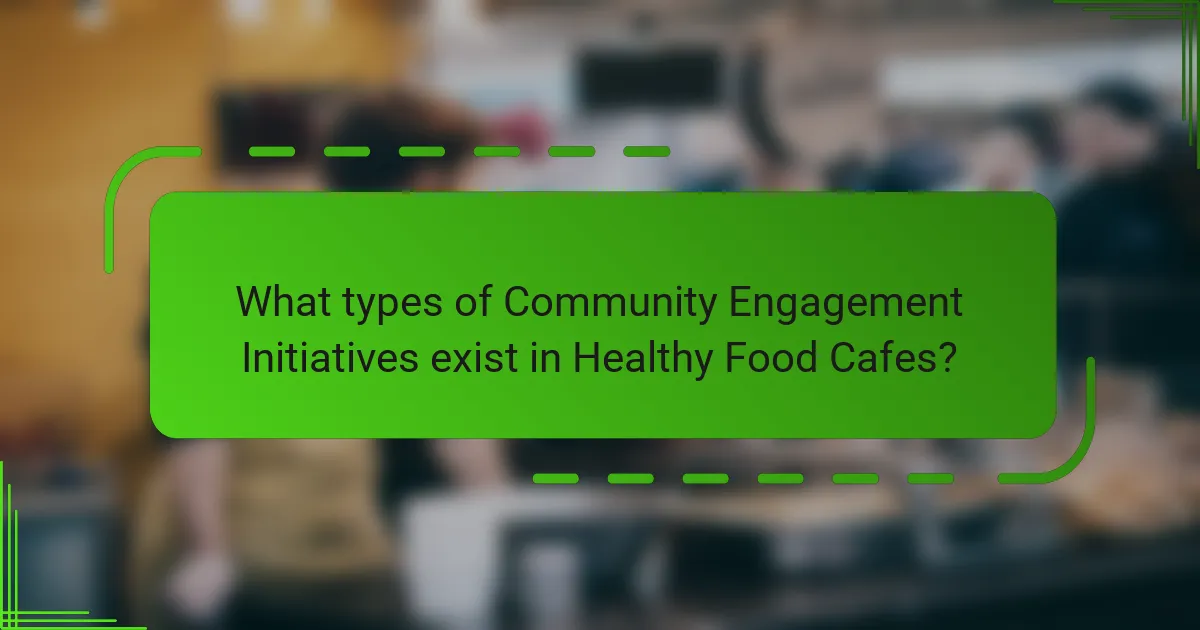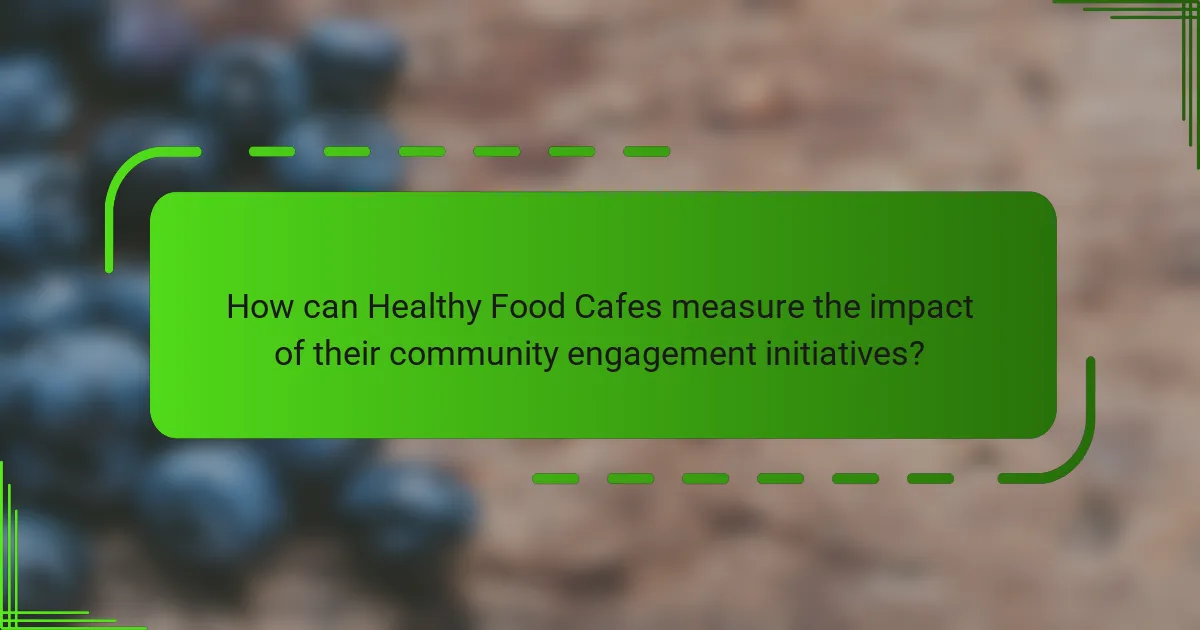Community engagement initiatives in healthy food cafes are programs that connect these establishments with their local communities, focusing on education and sustainability. Key components include workshops on nutrition and cooking, partnerships with local farmers, community dinners, and educational sessions on food waste reduction. These initiatives aim to strengthen community ties and improve public health by promoting healthy eating habits and sustainable practices. The effectiveness of these programs can be measured through surveys, event attendance, social media metrics, and collaboration with local organizations, providing insights into their impact on dietary habits and community involvement.

What are Community Engagement Initiatives in Healthy Food Cafes?
Community engagement initiatives in healthy food cafes are programs designed to connect the cafe with the local community. These initiatives often include workshops on nutrition and cooking. They may also involve partnerships with local farmers to promote sustainable sourcing. Events like community dinners foster social interaction and awareness about healthy eating. Cafes might host educational sessions on food waste reduction and sustainability practices. Research shows that such initiatives enhance community ties and improve public health outcomes. For example, a study by the Journal of Nutrition Education and Behavior highlights the positive impact of community-based nutrition programs on dietary habits. Overall, these initiatives aim to create a supportive environment for healthy living.
How do these initiatives contribute to sustainability?
Community engagement initiatives of healthy food cafes contribute to sustainability by promoting local food systems. They encourage the use of locally sourced ingredients, reducing transportation emissions. These cafes often implement waste reduction strategies, such as composting and recycling. They also educate the community about sustainable practices, fostering a culture of environmental awareness. Research indicates that community-supported agriculture can enhance local economies, supporting farmers and reducing carbon footprints. Additionally, these initiatives frequently host workshops and events that engage residents in sustainable food practices. This collective effort strengthens community ties while advancing sustainability goals.
What are the goals of community engagement initiatives?
The goals of community engagement initiatives are to foster collaboration and build relationships within the community. These initiatives aim to enhance participation in decision-making processes. They also seek to empower community members by providing them with resources and support. Another goal is to promote awareness about sustainability and healthy food choices. Engaging the community helps in identifying local needs and priorities. This approach leads to more effective and relevant programs. Research shows that active community participation improves overall project outcomes. Successful initiatives often result in stronger community ties and increased trust among members.
How do these initiatives foster local partnerships?
These initiatives foster local partnerships by creating collaborative networks among community stakeholders. They engage local farmers, suppliers, and organizations to source ingredients and resources. This collaboration enhances the local economy by supporting small businesses. Furthermore, initiatives often host events that bring together community members and local leaders. These gatherings promote dialogue and strengthen relationships. By involving local residents in decision-making, initiatives ensure that community needs are met. The emphasis on shared goals fosters trust and commitment among partners. Overall, this collaborative approach leads to sustainable practices and community resilience.
Why are Healthy Food Cafes important for community health?
Healthy food cafes are important for community health because they promote access to nutritious food options. These cafes often provide fresh, organic, and locally sourced ingredients. This helps combat food deserts where healthy options are limited. Research shows that communities with access to healthy food options have lower rates of obesity and chronic diseases. Additionally, healthy food cafes foster social interaction and community engagement. This social aspect contributes to mental well-being and a sense of belonging. They also serve as educational hubs, providing information on nutrition and healthy eating habits. Overall, healthy food cafes play a crucial role in enhancing both physical and mental health within communities.
What role do they play in promoting healthy eating habits?
Healthy food cafes play a vital role in promoting healthy eating habits. They provide accessible, nutritious food options that encourage balanced diets. These cafes often educate the community about the benefits of healthy eating. They host workshops and events focused on nutrition and cooking skills. Research indicates that communities with such cafes see improved dietary choices. A study by the American Journal of Public Health found that access to healthy food outlets increases fruit and vegetable consumption. Additionally, these cafes foster social interactions that reinforce healthy eating behaviors. Overall, healthy food cafes serve as key resources for sustainable eating practices.
How do they address food insecurity in local communities?
Healthy food cafes address food insecurity in local communities through various initiatives. They provide affordable, nutritious meals to low-income families. Many cafes partner with local farms to source fresh produce. This practice supports local agriculture while ensuring quality food access. Additionally, they often run educational programs on nutrition and cooking. These programs empower community members to make healthier choices. Some cafes also operate food donation programs to distribute surplus food. These efforts significantly reduce food waste while helping those in need. According to Feeding America, food insecurity affects 1 in 9 individuals in the U.S., highlighting the importance of such initiatives.

What types of Community Engagement Initiatives exist in Healthy Food Cafes?
Healthy food cafes implement various community engagement initiatives. These initiatives include educational workshops on nutrition and cooking. They often host local farmers’ markets to support regional agriculture. Community gardens are also established to promote sustainable practices. Cafes may organize volunteer events focused on food distribution to those in need. Partnerships with local schools for healthy eating programs are common. Many cafes offer loyalty programs that encourage community involvement. They also engage in social media campaigns to raise awareness about local food issues. These initiatives foster a sense of community and promote sustainability.
How do cafes implement educational programs?
Cafes implement educational programs by organizing workshops and classes focused on healthy eating. These programs often include cooking demonstrations and nutrition lectures. Cafes collaborate with local nutritionists or chefs to lead these sessions. Many cafes also provide informational materials about sustainable food practices. They may host community events that promote awareness of local food sources. Some cafes partner with schools to offer educational field trips. This engagement fosters a deeper understanding of food sustainability among participants. Studies show that such initiatives can enhance community knowledge and support for healthy eating practices.
What topics are covered in these educational initiatives?
Educational initiatives in healthy food cafes cover topics such as nutrition education, sustainable food practices, and community health awareness. They also address food sourcing, cooking techniques, and the benefits of local produce. Workshops may include meal planning and food waste reduction strategies. Additionally, these initiatives often promote the importance of balanced diets and the impact of food choices on the environment. Programs may involve partnerships with local farmers and nutritionists to enhance learning experiences. The goal is to empower communities to make informed food decisions. These topics are critical for fostering a culture of sustainability and health within the community.
How do these programs engage different age groups?
These programs engage different age groups through tailored activities and outreach strategies. For children, interactive workshops and fun cooking classes promote healthy eating. Teens are engaged through social media campaigns and peer-led initiatives that resonate with their interests. Adults participate in community gardens and nutrition seminars that cater to their lifestyle needs. Seniors benefit from cooking demonstrations and health talks focused on age-related nutritional concerns. Each program is designed to meet the unique preferences and needs of the respective age group, ensuring effective participation and learning.
What role do local events play in community engagement?
Local events serve as vital tools for fostering community engagement. They create opportunities for residents to connect with one another. Events often encourage participation in local initiatives. This participation strengthens social ties and enhances community identity. Research shows that communities with active local events report higher levels of civic involvement. For example, a study by the National Endowment for the Arts found that community events increase volunteerism and local collaboration. Local events also provide platforms for sharing resources and information. They can highlight local issues and promote solutions. Overall, local events are essential for building engaged and resilient communities.
How do cafes organize community events to promote sustainability?
Cafes organize community events to promote sustainability by hosting workshops, clean-up days, and educational talks. These events engage local residents in sustainable practices. Workshops may focus on topics like composting, gardening, or cooking with local ingredients. Clean-up days encourage community members to beautify local parks or neighborhoods. Educational talks can feature experts discussing sustainability issues. Cafes often collaborate with local organizations to enhance outreach. They may provide incentives such as discounts for participants. This approach fosters community involvement and raises awareness about sustainability. Research shows that community engagement increases participation in sustainable practices by up to 50%.
What types of events are most effective in engaging the community?
Interactive workshops are most effective in engaging the community. These events encourage participation and hands-on learning. Cooking classes, for example, allow community members to learn healthy recipes. They foster a sense of belonging and shared experience. Community gardens also serve as effective engagement tools. They promote collaboration and provide a space for social interaction. Additionally, health fairs raise awareness about nutrition and wellness. They offer resources and information to the public. According to a study by the Journal of Community Health, interactive events increase community involvement by 40%. This statistic highlights the importance of active participation in fostering community ties.

How can Healthy Food Cafes measure the impact of their community engagement initiatives?
Healthy Food Cafes can measure the impact of their community engagement initiatives through various quantitative and qualitative methods. They can conduct surveys to gather feedback from community members about their experiences and perceptions. Tracking attendance at events provides data on community participation levels. Analyzing social media engagement metrics helps assess the reach and effectiveness of outreach efforts. Cafes can also monitor changes in sales or foot traffic during community events. Collaborating with local organizations can provide insights into broader community impacts. Collecting testimonials and case studies showcases personal stories that highlight the initiatives’ success. These methods collectively offer a comprehensive view of the initiatives’ effectiveness and community influence.
What metrics are used to evaluate success?
Success in community engagement initiatives for healthy food cafes is evaluated using several key metrics. These metrics include participation rates, which measure the number of community members involved in events. Another important metric is feedback surveys, which assess participant satisfaction and areas for improvement. Additionally, social media engagement metrics track interactions and reach of promotional content. The number of partnerships formed with local organizations also indicates success in community collaboration. Lastly, changes in community health indicators, such as increased consumption of healthy foods, provide concrete proof of the initiative’s impact. These metrics collectively help gauge the effectiveness of community engagement efforts in promoting sustainability.
How can feedback from the community influence future initiatives?
Feedback from the community can significantly shape future initiatives. It provides insights into community needs and preferences. Healthy food cafes can adjust their offerings based on this feedback. For example, if customers express a desire for more vegetarian options, cafes can expand their menu accordingly. This responsiveness builds trust and loyalty among patrons. Studies show that businesses that engage with their community see increased customer satisfaction. Additionally, community feedback can highlight areas for improvement in sustainability practices. By incorporating suggestions, cafes can enhance their environmental impact and operational efficiency.
What are best practices for Healthy Food Cafes in community engagement?
Healthy food cafes should prioritize community engagement through collaboration and education. Collaborating with local farmers fosters a farm-to-table approach. This supports local economies and promotes sustainability. Hosting workshops on nutrition and cooking builds community knowledge. Engaging in local events enhances visibility and connection. Offering discounts or loyalty programs encourages community participation. Implementing feedback mechanisms allows cafes to adapt to community needs. These practices create a strong community bond and promote healthy eating habits.
How can cafes effectively collaborate with local organizations?
Cafes can effectively collaborate with local organizations by establishing partnerships that align with their community goals. They can host events that promote local causes, such as fundraisers or awareness campaigns. This increases visibility for both the cafe and the organization. Cafes can also source ingredients from local farms or suppliers, supporting the local economy. Such practices enhance the cafe’s commitment to sustainability. Additionally, sharing resources, like space for meetings or workshops, fosters community engagement. Collaborations can include joint marketing efforts, amplifying outreach and attracting new customers. Evidence shows that cafes involved in community partnerships experience increased customer loyalty and foot traffic.
What strategies can cafes adopt to enhance community participation?
Cafes can enhance community participation by hosting regular events and workshops. These activities create opportunities for locals to gather and connect. Cafes can also collaborate with local artists to showcase their work. This supports the arts and draws in community members. Providing a space for community meetings fosters engagement. It allows residents to discuss local issues and initiatives. Cafes can implement loyalty programs that reward community involvement. This encourages repeat visits and strengthens relationships. Partnering with local farmers for sourcing ingredients promotes local economy support. It also educates customers about sustainable practices. Finally, utilizing social media for community feedback can help cafes understand local needs. This interaction builds a sense of belonging and community ownership.
Community engagement initiatives in healthy food cafes are programs aimed at connecting cafes with local communities through workshops, partnerships, and events that promote nutrition and sustainability. These initiatives enhance community ties, improve public health outcomes, and address food insecurity by providing access to nutritious food options. The article explores the various types of initiatives, their contributions to sustainability, and the importance of local partnerships, while also highlighting effective strategies for community participation and methods for measuring the impact of these programs. Overall, healthy food cafes play a crucial role in fostering a culture of health and sustainability within their communities.